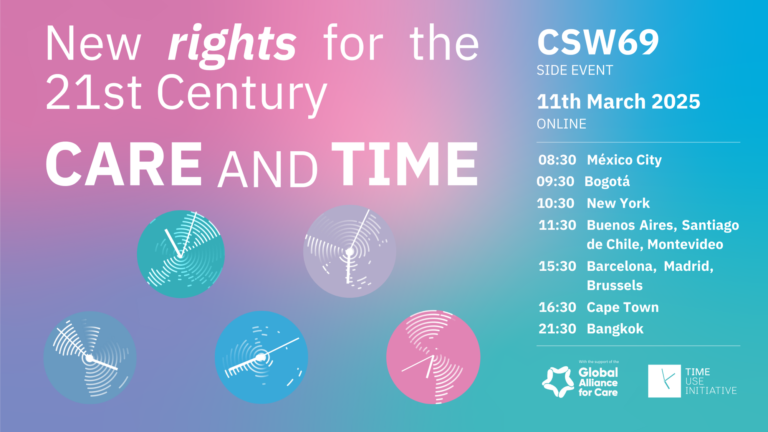Retrieve the event
Objectives
- Delving into the definitions of the rights to care and time as narratives and frameworks.
- Exploring how their recognition impacts the well-being of women and caregivers.
- Exemplifying their implementation by discussing innovative policies implemented in cities and regions worldwide.
With the participation of
- Ana Moreno, Technical Secretary of the Global Alliance for Care.
- Marta Junqué, Director of the Time Use Initiative.
- Ana María Buriticá, Advisor of the Secretary for Women of Bogotá City Council, World Capital of Time Policies 2025.
- Diana Rodriguez Franco, Special Advisor on Gender and Diversity to the President, Inter-American Development Bank.
- Gemma Parera, Technical advisor in the Social Sustainability, Life Cycle and Community Area of the Barcelona Provincial Area.
- Paola Simonetti, Director of Equality Department, International Trade Union Confederation (ITUC).
- Nuria Borrut Valdivias, municipal focal point for the Concilia programme of the Barcelona City Council.
- Beatrice Ganassin, user of the Concilia programme in the Carmel neighbourhood (Barcelona, Spain).
Moderator: Johanna Schima, Vice-President & Head of EU Delegation of Make Mothers Matter.
Background
Right to time and right to care are meant to be key rights in the 21st Century.
Care is a right: the right to care, to be cared for, and to take care of oneself (self-care) (Pautassi, 2007). It has gained recognition in this century. It began to be used as such in the 2007 Convention on the Rights of Persons with Disabilities. However, it was in the 2015 Inter-American Convention on the Protection of the Human Rights of Older Persons, that was explicitly considered as the right to care. The Regional Conferences of Women in Latin America have been pioneer spaces for the recognition of this right. The Quito Consensus of 2007 recognizes caregiving as a public matter within the purview of States, local governments, organizations, companies, and families. Care as a right was present in the following conferences: Brasilia (2010), the Dominican Republic (2013), Uruguay (2016), Santiago de Chile (2020), and Buenos Aires (2022). In the latter, the Buenos Aires Commitment was adopted in November 2022, charting a path towards a care society and recognizing the right to provide and receive care, including self-care. According to Pautassi (2023), recognizing care as a right establishes responsibilities, guarantees, and satisfiers, with a central role conferred to the State and creating obligations for the private sector, the markets, and communities in its conjunction, including men (p. 4).
Care is essential in the sustainability of our daily lives. Cooking, cleaning, taking care of a child, an older person, or someone who is ill or has a disability are tasks performed daily, predominantly by women in the household. All of these activities require time, and according to ILO, worldwide, women dedicate 3.2 times more time to unpaid care work than men. During the COVID-19 pandemic, due to the closure of preschool, primary, and secondary education institutions, an additional 672 billion hours of unpaid childcare were required globally, with women taking on an estimated 512 billion (76%) of those hours (UN, 2024). The time that women overspend, due to gender stereotypes, in care work generates time poverty, which translates into women not being able to dedicate space to pursue their professional growth, education, well-being, and self-care.
Such gender stereotypes rely on a two-century-old division of time: the 8-hour triangle, which at the same time is at the basis of the sexual division of care work. Current societies need to visualize and allocate time to care as an indispensable time for sustaining the social reproduction of life and the different needs it encompasses — caring for children and ageing populations, allowing an equal distribution of care work. As such problems are common to all, we can acknowledge time as a societal issue, as stated by the Barcelona Declaration on Time Policies (2021). Looking at cities, regions, and states through the lens of time and care work across sectoral and organizational boundaries is vital.
Time, therefore, can also be designed as a right: it is the recognition of people’s fundamental need for an appropriate balance between time dedicated to work, care, rest, and leisure. This emerging civic right grants individuals the autonomy to decide on such distribution, considering it an essential element for well-being and quality of life (Boulin, Iparraguire, Rey, 2023) — and, as a framework, it aims at rethinking established schedules and time allocation to different areas of daily life.
We argue that the right to care and time are then interlinked. Just as care, time is an essential component of quality of life. Self-determination in how people spend their time and how they receive and provide care is essential to achieving a more just society for all people.
Further readings
Boulin, J. Y., Iparraguire, G., Rey, P. (2023). The Right to Time – perspectives for the 21st century. Time Use Initiative.
Pautassi, L. C. (2023). The right to care: From Recognition to Its Effective Exercise. Friedrich-Ebert Stiftung (FES).




